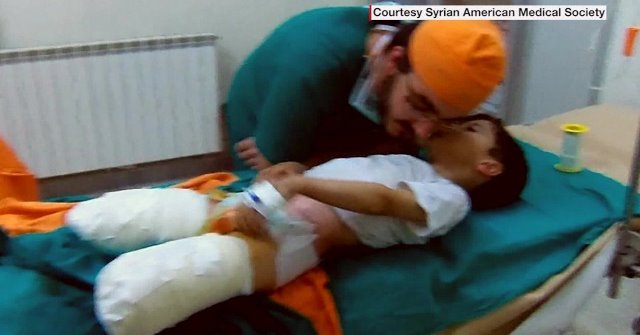Almost 5 million Syrians have fled their country during the ongoing civil war. According to the United Nations, almost 400,000 have died so far in the fighting.
For many of those left behind, life is a daily struggle for survival amid airstrikes and shelling.
Syrian American Medical Society (SAMS) is a US-based relief organization providing medical care in Syria as the civil war rages. The charity has about 1,700 doctors working in 110 medical facilities that have treated 3 million people across the country. SAMS provides immediate trauma and intensive care — as well as offering specialty, long-term care.
Its medical team works against the backdrop of constant fighting. Dr. Ahmad Tarakji, president of SAMS, said that hospitals are prime targets for airstrikes. The organization’s largest trauma hospital was bombed in October.
“It’s like waking up from death. You cannot see a lot because the dust is all over the place,” said Tarakji. “You see blood on your clothing, and you don’t know if it’s yours or somebody else’s.”
Resources sometimes scarce for mobile clinics
SAMS created mobile clinics to treat people where hospitals have been destroyed or in rural areas with large populations of displaced people.
While the organization has been able to open mobile clinics throughout Syria, they sometimes have limited resources. It’s a struggle to get medical supplies and food to these clinics safely. SAMS partners with other international humanitarian organizations to get supplies to the clinics.
Another area of need is maternity care. Tarakji said many pregnant women are too scared to give birth in hospitals, knowing they are heavily targeted. SAMS has a team of midwives that go to the women’s homes — only taking the mother and newborn to the hospital if there is a critical need.
Tarakji said most of the medical staff lives in the hospitals and clinics, knowing they could be attacked at any moment. “It’s natural for many of us growing up that if there is a major threat that you run away, you seek refuge somewhere. It’s exactly the opposite inside Syria,” said Tarakji. “Our physicians were there. They did not leave until everybody was out, and they made sure that everybody is safe.”
Children caught up in conflict
The continuous airstrikes and constant fear of death has also taken a huge psychological toll on Syrians, especially children. SAMS provides psychosocial care through individual and group therapy.
“The children have seen a lot of suffering,” said Tarakji. “Many of them have these daily nightmares because of the bombardments and chemical weapons that they witness — and losing their families as well.”
Tarakji said many children suffer from anxiety and depression and tend to exhibit more aggressive, violent behavior. Many are traumatized, not knowing if their parents are alive — clinging on to the nearest doctor or nurse they can find. “Those children when they lost their parents, they’re crying; and they don’t have anybody. You’re not able to find their parents, and probably you’ll be the only parent for them for that minute.”
In spite of all the horror, Tarakji said SAMS is optimistic about the future and wants to rebuild communities and the lives of the Syrians. “We want to stabilize communities, build better communities in the future,” he said. “We want to have dignified medical care with easy access … saving lives, alleviating the suffering, and we want to stand for our humanitarian values that we all share and believe in.”



